Jeremie Averous's Blog, page 137
April 16, 2013
What should you do with Criticism?
It’s good to have critics. It shows you are contributing to a worthwhile shift. It means people pay attention to you. It can contribute to improve your product, your art. Here are 6 reasons why criticism is a good thing.
It’s also bad to have critics when it influences you not to give out your best. There are times where you shouldn’t listen to them. There are times you should only listen to you, what brings you alive and what you know the world needs.

Typical critics at work
So, when should you shun critics and when should you listen to them?
Let me take an example which is close to my heart.
As I am considering a new book it is clear that the topic of the book is non negotiable. It is a message that is growing within me for some time now and that I need to deliver to the world.
The format of the book, whether it will be a story or a non-fiction style, that’s more open to discussion and suggestions. I will still have a strong opinion and I will own the final format.
Finally, the detailed word-for-word editing is something that I consider to be quite open to criticism and improvement (in particular, as English is not my first language).
So it should be for your creations: the main message should not be negotiable; you should own most of the outline of the delivery; and leave critics deal with the detailed editing.
Alas, many people let critics influence their main message and make their detailed editing not negotiable. Don’t fight the wrong battle. It is your main message, coming from your heart, that is the most valuable.

April 13, 2013
Why, even in a Complex World, you Need to Head Towards your Purpose!
In an ever more complex world where many events become difficult to predict, our tendency would be to follow the flow, let the events drive us.
That’s not how we’ll reach greatness. An acute observer of companies taking decisions in complex environments, Jim Collins, the famous author of Good to Great and his latest book Great by Choice, states:
“Most people start with the outside world and try to figure out, how can we adapt to it? Greatness doesn’t happen that way. It starts with an internal drive. And there is really a key question with big decisions: What are your core values and your real aspirations?”
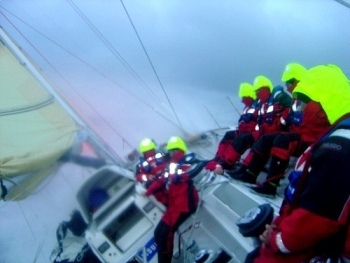
While the storm might bring you astray from the route, you sure still know where you want to go!
It is vital to have a direction when it comes to taking decisions, even in a complex world. Personal Purpose is essential, aligned with your core values and true aspirations. And actually, Jim Collin’s research shows that the most successful companies are those that maintain their heading the most consistently. Like the captain of a ship in the midst of a storm, he can accommodate temporary changes of direction to minimize the effect of wind and waves, but still knows where his goal lies.
Be agile in responding to events. But keep your eye fixed on where you want to go, and come back to your initial heading! Only then, of course, will you be able to reach it!
Quotes are from the foreword to the book The Greatest Business Decisions of All Times by Fortune Magazine editors

April 11, 2013
Why We Need to Stop the Race for Complication
“Simplicity has been difficult to implement in modern life because it is against the spirit of a certain brand of people who seek sophistication so that they can justify their profession” – Nicholas Taleb in his highly recommended new book, Antifragile.

Simplicity quote by Leonard de Vinci
During my time as a civil servant I could not stop wondering (and admiring) how bureaucrats were constantly complicating rules and processes “to better take into account individual situations and avoid threshold effects”. Bureaucrats cannot imagine anything different than complicated systems and procedures. But what they did not realize is that real life is complex. And complication is not the same as complex! Their quest to manage the complex using even more complicated rules is doomed to fail. Yet they continue. Legal systems become increasingly bloated as they try to deal with all sorts of situation. This quest will be lost – nature will always be far more imaginative than the most imaginative bureaucrat.
Let’s stop this stupid quest for complication. The solution lies in simplicity. Because complex systems – real life – will react and adapt to simple messages and solutions. Because the cost of complication is far greater than its advantage. Let’s seek simplicity in all we do – and suddenly we’ll tame complexity.

April 9, 2013
Complicated is not the same as Complex – and Why this is Important
Complicated is a very different concept from Complex. Yet most of us do not distinguish them. Even more, we try to manage Complex systems with Complicated solutions. And this turns out to be a very huge problem.

A watch: a complicated system – predictable and reliable
A watch is complicated. It is composed of a large number of pieces; yet they are carefully engineered to fit and move together. The system is very reliable (it’s a watch!). Most engineered systems are complicated, yet reliable. The more the components fit seamlessly together, the better the reliability.
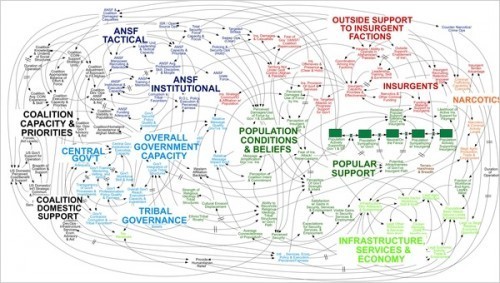
A complex system: a representation of the situation in Afghanistan
On the contrary, a complex system involves a lot of different components or contributors; they are all interconnected and inter-dependent; but they all follow a different interest, and they make the system unpredictable. The now classical slide describing the situation in Afghanistan to General McCrystal is a classical example of the depiction of a complex system.
Complex systems are unpredictable. They are what happens in real life outside what can be carefully engineered. They are what creates the unforeseen, the adventure.
Because we mix all the time those two concepts we misunderstand a lot of what is happening around us. The way to tackle and repair complicated systems is completely different from how we can influence complex systems. The way these systems fail belongs to different realms. And when a complicated system encounters unpredictable complexity, it is where our engineering capabilities are overwhelmed. It is where our certainties become shaky. It is when catastrophes like Fukushima happen.

April 6, 2013
How Many Seeds Did You Plant Today?
“Don’t judge each day by the harvest you reap but by the seeds that you plant” – Robert Louis Stevenson.
 Our life is uncertain and unpredictable. We can’t know what will come out of our latest initiative, and possibly, it will look quite different from what we envisaged.
Our life is uncertain and unpredictable. We can’t know what will come out of our latest initiative, and possibly, it will look quite different from what we envisaged.
What we can do, though, is make sure we plant everyday enough seeds so that when they grow, we’ll have a few successes among the outright failures and those other seeds that won’t grow any useful products. Most of what you start will fail. It’s just a matter of starting enough stuff to succeed.
Ask yourself how many seeds you planted today: how many new people you met, how many initiatives you started or tested. That’s what should be your golden standard.
How will you double the number of seeds you plant daily, weekly?

April 4, 2013
Why our Current Political System is Reaching its Limits
Political systems (autocracy, representative democracy, etc) including the way they are implemented, have a limit: a given political system can only manage up to a certain level of complexity.

Are our current democratic institutions reaching the limits of the complexity they can manage?
When that maximum level is reached, fragility becomes a key property of the system, and the system will one day break apart. Suddenly. Completely. The Soviet political system was unable to bear the complexity driven by the Western world in the 1980′s; and to manage the inherent complexity of the modern world (as shown by the Tchernobyl accident investigation). The French political system in the 1700′s became unable to manage the increasing complexity and globalization of the world. The French Revolution and decades of instability ensued.
Sometimes (rarely), political institutions succeed in reforming themselves before reaching a critical level of fragility.
Our current representative democracies are probably the most elaborate political system, and can manage a far higher level of complexity than any of the previous political institutions. We can see everyday that autocratic regimes are overwhelmed by much lower levels of complexity. Still, the question is now, whether it can manage the level of complexity we are reaching globally?
I fear that it is not the case and that currently, we are reaching uncomfortable levels of institutional fragility. Representative democracy might need to be replaced by (or, evolve in) a new political system that will be better to deal with the current level of complexity – by choice or by default if we reach the limits before we can change. That new system needs to leverage better on networks and direct democracy. It needs to be much more global.
Let’s start now to build this new political system, before the increasing fragility of the previous one creates dramatic consequences.

April 2, 2013
Bringing the World Closer: Real-Time Audio Translation is Live
While automatic translators on internet make it easy nowadays to understand at least the sense of a text in any other language, live audio translation between languages was only something of the future.
Is that really so? In that stunning demonstration, a Microsoft executive demonstrates both live text and audio translation between English and Chinese (if you don’t have time to watch the 9 min video, watch after 6:40 for the live audio – here is the link to YouTube for that part of the video):
More information on that technology breakthrough on this TheNextWeb post: “Amazing: Microsoft turns spoken English into spoken Mandarin – in the same voice”
The world just became smaller!

March 30, 2013
Why You Should Fail More Often
Let’s come back to the financial markets as a model of complex system that can be easily measured. What are the strategies that can provide gains with limited risks and significant chance of success?
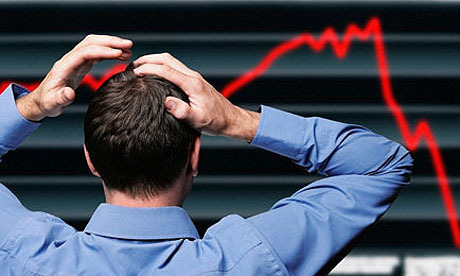
Investment is more about managing the emotions of failure than it is about being clever
Professionals will tell you that the winning strategies (provided there are winning strategies,as we now can doubt from our post on the superiority of randomness) always involve some dose of failure. The trick is to have less failures than wins, and / or smaller failures than wins. As long as you invest more on stocks that have chances of recovering, over time this strategy will provide interesting returns with a relative certainty – the larger returns being generated by the larger or more frequent number of tries.
What is interesting here is that real professionals that deal with the stock market everyday will never speak of ‘sure win’. They know they have to accept a certain amount of failure. They know there will be bad days as there will be good days – only hopefully slightly less frequently. They know they will have to deal with the emotions of failure and not let themselves be driven by them.
In our real life, that complex system, the lesson holds. We can’t succeed without a certain dose of failure. And the more often we try, the higher will be our overall success. We just need to make sure that any failure will not kill us (that we have a cut-loss soon enough) and that our successes have a bigger upside than our failures’ downside.
In complex systems, frequent failure is the key to success. So, when do you start to fail more often?

March 28, 2013
How Big Data Will not Help our Understanding of Complexity
It is not possible anymore nowadays to open a serious newspaper or a financial investment document without reading about the great prospects of “Big Data”: analyzing the troves of data progressively acquired by organizations when we surf, shop, spend money, etc., to create Value. And companies have been setup which raise money on the markets to exploit data like other exploit mines and oil wells.
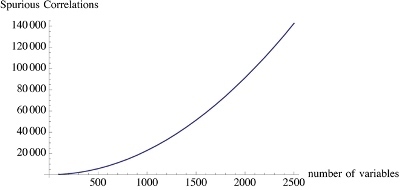
The number of spurious correlations increase with the size of the data. Be careful when you read about discoveries from “Big Data”!
Be careful, says Taleb in his book Antifragile, lots of data also means lots of spurious correlations. The argument is detailed in the book and in this Wired Article “Beware the Big Errors of ‘Big Data’“, from which we reproduce the curve on the right (it is also in the book).
To translate the point in conventional language, the bigger the size of the data and the number of potential variables considered, the higher the probability that bullshit is produced when it comes to the identification of possible trends. From there to consider that all this “Big Data” trend is just a vast hoax, there is a step we won’t take (I don’t invest in this “Big Data” thing unless it is very focused application). However, this potentially shows that a high proportion of the ‘discoveries’ that people do analyzing “Big Data” will be spurious. Be careful next time you read about one of these new ‘discoveries’.
A further challenge: is it really possible to understand complexity through more advanced data analysis? Following Taleb, we can have high doubts about that. In particular because all data analysis tools will never consider anything than conventional statistical approaches, and will never consider those discontinuities and benefits from volatility which makes real life what it is: interesting!

March 26, 2013
Must Read: “AntiFragile” by Nassim Taleb
The latest book of Nassim Taleb, Antifragile, is an absolute must-read. It puts a lot of common wisdom on its head and provides an interesting picture of the mistakes of the society surrounding us.
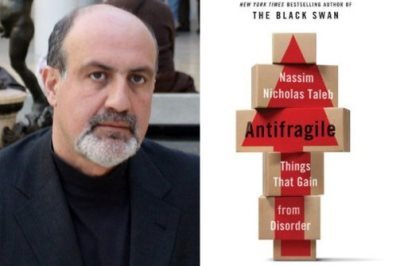 The book is thick and takes some effort to read through, but it’s worthwhile to take the time. Taleb is a very unconventional thinker; his approach to complexity and predictability is absolutely brilliant.
The book is thick and takes some effort to read through, but it’s worthwhile to take the time. Taleb is a very unconventional thinker; his approach to complexity and predictability is absolutely brilliant.
What is Antifragile? According to Taleb it is the property to thrive in situations that are highly uncertain and volatile.
Most of the things we produce are fragile. The Industrial Age civilization, through its manufacturing standardization and search for efficiency, tends to be fragile. And actually it would seem, according to Taleb, that modern civilization is much more fragile than before. Look at how single freak events like 9/11 or other terrorist attempts fundamentally change the life of travelers and how we are ever more deeply intolerant to unexpected events.
Fundamental mistakes of our scientific approaches are denounced in the book, in particular our custom to observe averages when volatility might be an even more influential parameter; and the limits of conventional financial statistical analysis.
In summary, take the time to read AntiFragile. It gives also an insight on how our world might become when we overcome some psychological hurdles from the Industrial Age. Several posts will be posted here that will inspire themselves from the book in the next few weeks.




